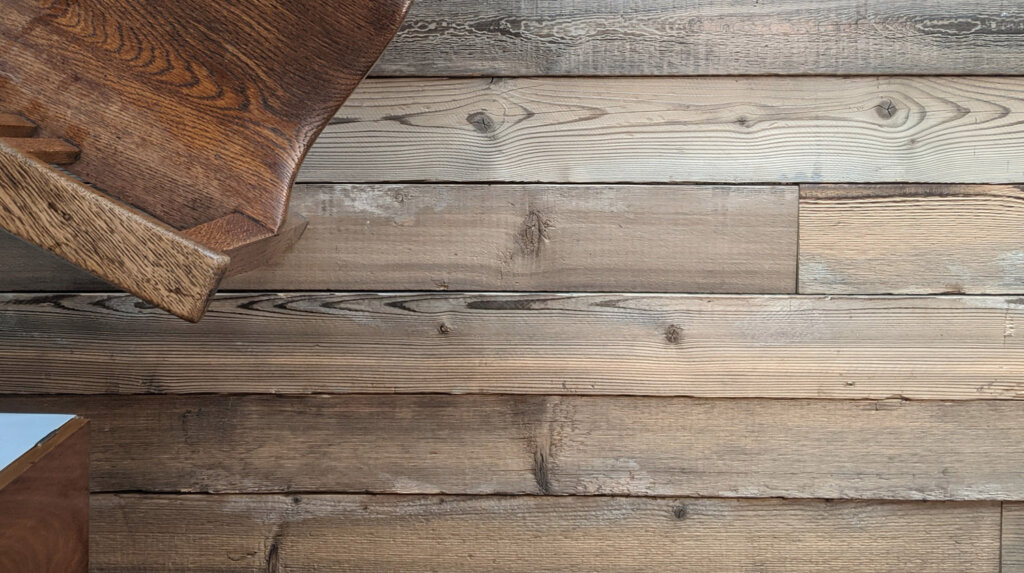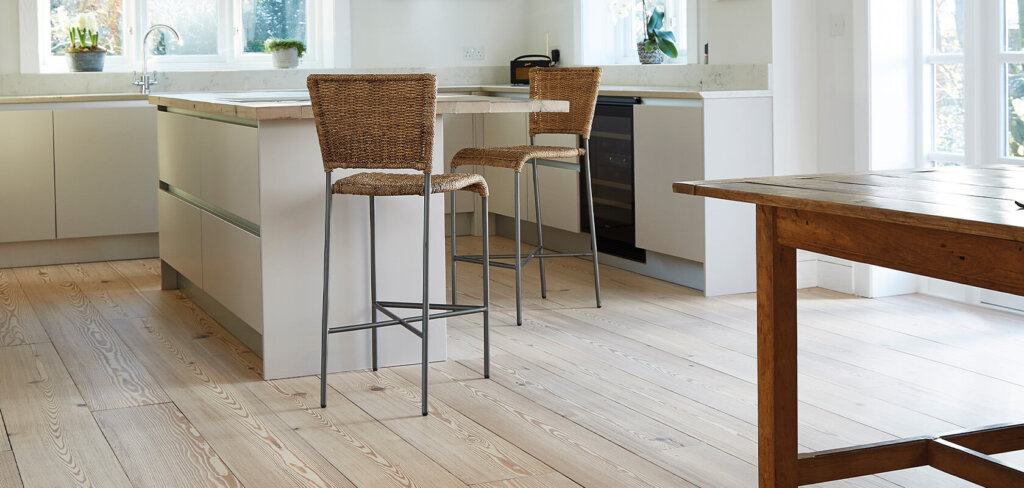When considering flooring choices for a project, clients and designers are now heightening the importance of selecting products that not only help protect the environment, but also promote the health and well-being of the end-user. One way in which they are achieving this is by specifying a plastic-free floor.
Climate change has been a big topic for many years now and in 2020 the world was seen to be responding like never before.
People have become more aware of the nonrecyclable amount of plastic being produced and the impact this has on the planet, with the conscious consumer pushing this cause forward. Like many companies who are doing more to limit their impact on the environment at Ted Todd, we aim to use only independently certified new woods to supply 100% certified new woods over the next few years. 4/5 of our new wood floor sales are constructed from certified timber and we have been FSC certified from the moment we started making new wood floors in 1997 – which is a long time before green flooring became a mainstream issue, and we do not charge any extra any this certification, it comes as standard. It’s fair to say too that reclamation is at the heart of our business with re-purposed wood making up 20% of our sales.

But why choose Plastic Free Flooring?
Vinyl is 100% synthetic and man-made. It’s made from materials such as fiberglass, PVC and mixed with various other man-made chemical compounds.
The popularity of vinyl floors is continuing to increase due to their durability and affordability. There are designs that even emulate wood planks or stone tiles! But the benefits of a plastic free floor, such as natural wood, still far out way the aesthetics or practical positives that a man-made choice can offer.
Have you ever wondered why new or recently refurbished buildings have such a distinctive odour? Often, it’s the result of the new materials; furnishings, paints, and chemicals used inside the building. Once installed, man-made materials go through a process called off-gassing – which usually lasts up to 4 weeks after installation.
Carcinogens such as polyvinyl chloride and BBP are worryingly present in vinyl flooring for example.
This is because Luxury Vinyl Flooring or LVT is made from PVC. PVC contains hazardous toxins which are harmful to human health and the environment. They can be exasperated further by environmental factors such as heating or cleaning products, as such, off-gassing can continue for months and even years after installation, making it vitally important to limit exposure to them as much as possible.
Semi volatile organic compounds (SVOCs) have also now been identified as emitted mainly from synthetic man-made materials. Research into the adverse health effects of SVOCs is still at an early stage, but links are now being made between these molecular airborne pollutants and many health and well-being issues.
Additionally, it’s not only our health which can suffer as a result of these toxins, they are also released during the manufacturing process too which is massively damaging to the environment.
Some LVT flooring manufacturers may remove these phthalates from new vinyl flooring, mainly in the surface layer of the product, but they still can’t compete with a natural product like wood flooring.

Characteristics of non-toxic flooring
Natural, organic and non-toxic flooring can have a massive impact on indoor air quality. Opting for eco-friendly flooring is a great place to start if you want to minimise the short and long-term adverse health effects you might experience if you opted for a man-made alternative. By making sustainability a primary consideration you’ll be off to a good start not only from an environmentally friendly perspective but for creating a plastic-free home or commercial project.
Timber is a natural product and by using a wood-based material, especially one that is FSC certified, your eco-friendly flooring choice could in fact have a negative carbon footprint!
Non-toxic flooring should also be low in VOCs and more recently, the worrying discovery of SVOCs – Semi Volatile Organic Compounds means this should also be a consideration. At Ted Todd we have done extensive research and testing into our products and we are very proud to be the first wood flooring company in the world able to display the ‘SVOC Free’ logo on all of our wood-based products. To understand more about the effects of indoor air pollutants and what exactly VOCs and SVOCs are you can read our guide ‘Healthy On The Inside’
It has also been shown that viruses can remain active for up to four times longer on vinyl and other plastic man-made surfaces when compared to natural products such as wood. This is mainly due to the microstructure of wood and the presence of antimicrobial substances which work to naturally reduce the bacteria numbers and inactivate surface viruses.
Types of Eco-Friendly Flooring
There are more options of Eco-friendly flooring to choose from than ever before.
Related: Engineered wood flooring and solid wood flooring
There are many reasons why a natural wood floor is both beneficial to the environment and your health and well-being. All of our floors are natural, contain no PVC, and have low VOC emissions (as mentioned earlier they are also SVOC Free). Additionally wood is the only construction material that locks away carbon. In June 2019 the UK legally committed to cut emissions of carbon dioxide and other greenhouse gases to net-zero by 2050. So, it’s beneficial to know that you’re choosing the world’s most environmentally friendly construction material and preparing for the future, today.
Cork
Carbon friendly, organic and formaldehyde-free, cork flooring has low VOC and is classed as non-toxic flooring. Made from the bark of the cork oak tree, cork can be harvested from the same tree for over 200 years and just like hardwood, both are naturally free of PVC too.
Bamboo
Strong, durable, antimicrobial and eco-friendly bamboo flooring is actually made from grass, not wood. This versatile product makes a sound environmental choice because of how fast it grows making it an easily renewable product.
Ceramic tiles
Made from natural products extracted from the earth, ceramic tiles can be long-lasting with zero VOCs, plus because of their hard surface they don’t hold dirt and dust.
Wool carpets
Wool is 100% a natural product. But like a wood floor it’s important to make sure your wool carpet is made entirely from renewable sources. Plus, if it’s is backed in a natural latex it is completely biodegradable – in the right conditions of course.

Advantages of non-toxic flooring
Low VOCs and SVOC Free – harmful to both humans and animals, the full effects of volatile and semi-volatile organic compounds are as yet unknown so choosing a low VOC or SVOC free floor should be top of your list if you are looking for non-toxic flooring in the UK.
Wellness Enhancing – In Sally Courthard’s recent book, Biofilia: You + Nature + Home, 2020, she says, “humans need a connection with nature to be content”. You can enhance your connection with nature through your material choices. It’s proven that the benefits of natural products, natural lighting, good ventilation and the use of greenery indoors can make you feel good at home or in a shared space.
Carbon Neutral Wood is the only construction material that stores carbon. ‘In June 2019 the UK legally committed to cut emissions of carbon dioxide and other greenhouse gases to net zero by 2050’ and in this paper by the BMJ (a website for healthcare professional) they ‘argue that carefully considered policies to lower carbon emissions can also improve health’.
Sustainable – For the most eco-friendly flooring choice your primary consideration should be sustainability. The FSC certification for example ensures that forests are well managed for the production of wood based products with an emphasis on combatting deforestation and the global protection of forests.
Recyclability – If plastic flooring is laid loosely, then potentially the flooring can be recycled at the end of its lifecycle or use. However, if it is adhered to the sub floor, which is the case in most installations, recyclability is not currently a viable option. Meaning that sadly that floor will end up in landfill. Ted Todd and Woodworks floors have been created to last a lifetime, however, should your floor come to the end of its use it’s good to know that they can be fully recycled, unlike manmade plastic alternatives.

In conclusion
The benefits of plastic free, non-toxic flooring are:
• Our own health and well-being
• Environment health and wellbeing
• Improved water
• Improved air quality
• Biodiversity
• Protection of natural habitats
It is important to point out that in order to maintain the eco-friendly properties of your chosen product, they shouldn’t be used with non-toxic adhesives and glues. A Ted Todd we offer a variety of solvent free finishes and all our flooring adhesives meet the European safety E1 standard which signals the maximum levels of formaldehyde each piece of flooring can contain.
As we touched on earlier, it is important to check that the flooring you’ve chosen has the accompanying certification – such as the Forest Stewardship Council (FSC) or the Programme for the Endorsement of Forest Certification (PEFC). You should also look at a company’s ‘Chain Of Custody’ certification that tracks wood materials and products through every stage along the supply chain. To find out more about Ted Todd certification and why we go the extra mile for these accreditations visit our Certified Wood page.
We appreciate that it can sometimes be tricky making environmentally friendly purchasing choices for a plastic free home, so talk to our team about how hardwood flooring can make the perfect high quality, environmentally friendly, plastic-free choice for any project – Get in touch